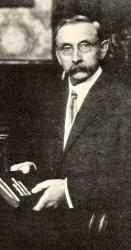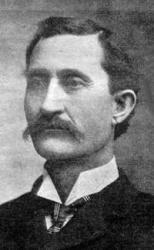
1855 - 1941 Hymnal Number: 101 Composer of "[Have you heard the invitation?]" in Crowning Praises Jacob Henry Hall, 1855-1941
Born: January 2, 1855, near Harrisonburg, Virginia.
Died: December 22, 1941.
Buried: Dayton, Virginia.
Son of farmer George G. Hall and Elizabeth Thomas Hall, Jacob attended singing schools taught by Timothy Funk when he was a boy. As his love of music progressed, he earned money by trapping quail and bought a German accordion; he soon learned to play one part while singing another. After he and his brother jointly purchased an organ, he taught himself to play hymn tunes, Gospel songs, and anthems. He went on to study music theory, harmony, and composition in Harrisonburg and elsewhere, and in 1877 attended a Normal Music School in New Market, Virginia, taught by Benjamin Unseld and P. J. Merges. Afterward, he partnered with H. T. Wartman for two years to conduct singing schools and conventions. In 1890, Hall attended Dana’s Musical Institute in Warren, Ohio, and a normal school run by George & F. W. Root at Silver Lake, New York. He later served as principal of the National Normal School of Music.
Hall’s works include:
Hall’s Songs of Home, 1885
The Star of Bethlehem (Dayton, Virginia: Ruebush-Kieffer Company)
Musical Million (assistant editor)
Spirit of Praise, with William Kirkpatrick & Charles Case (Dayton, Virginia: The Ruebush-Kieffer Company, 1911)
Hall’s Quartettes for Men, 1912
Biography of Gospel Song and Hymn Writers/em> (New York: Fleming H. Revell Company, 1914)
Sources--
Hall, pp. 329-34
Lyrics--
Glorious Morning Dawns, The
O Thou Whose Matchless Power Controls
--hymntime.com/tch
J. H. Hall





